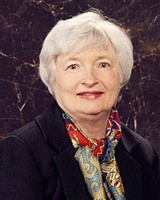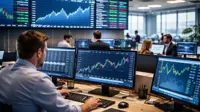Fed's Yellen raises concerns about overheating of US economy
20 Jan 2017
The Federal Reserve should continue with its modestly accommodative monetary policy and raise interest rates slowly to avoid harming the recovery that the central bank has so far sought to nurture, Federal Reserve Chair Janet Yellen said on Thursday.
 ''I think that allowing the economy to run markedly and persistently ''hot'' would be risky and unwise,'' Yellen said at the Stanford Institute for Economic Policy Research.
''I think that allowing the economy to run markedly and persistently ''hot'' would be risky and unwise,'' Yellen said at the Stanford Institute for Economic Policy Research.
Yellen said with the unemployment rate near its longer-run normal level and likely to move a bit lower this year, it is undesirable to overheat the economy with very low interest rates.
While there are no signs as yet that the Fed is behind the curve or the economy is in danger of a sudden surge in inflation, she said, ''I consider it prudent to adjust the stance of monetary policy gradually over time.''
She said while it is true that many employers report difficulties in finding qualified workers in selected occupations, and more workers are comfortable quitting jobs to take or look for better positions, that only points to the health of the labour market. ''But this is to be expected in a healthy labour market and not evidence that the economy as a whole is experiencing a serious worker shortage,'' she said.
However, she said, recent behaviour of wages provides additional evidence pertaining to the degree of labour market slack - increases in average hourly earnings, the employment cost index, and compensation per hour - remain subdued, picking up only modestly of late, adding that these data do not seem consistent with an overheated labor market.
Moreover, she said, signs of overheating in the broader economy are also scarce. For example, capacity utilisation in the manufacturing sector is well below its historical average. Most importantly, although core inflation is rising gradually from a low level, this increase mainly reflects the waning of the effects of earlier movements in the dollar, not upward pressure from resource utilisation.
Although the labour market is not overheated currently, this could happen as labour market conditions strengthen further, causing inflation to surge. This, she said, is an unlikely ossibility in the near future.
Average payroll gains moderated from 250,000 per month in 2014 to 180,000 last year, and the unemployment rate declined 1-0.75 percentage points cumulatively over 2014 and 2015, compared with only 0.25 percentage point last year.
Second, economic growth more broadly seems unlikely to pick up markedly in the near term given the ongoing restraint from weak foreign demand and other factors.
The downward pressure that the Fed's $4.5 trillion balance sheet has been exerting on rates for the last several years is declining, she said, making it all the more important to raise rates only gradually.
The Fed last month raised its short-term interest-rate target for only the second time in a decade, but signaled it would likely speed up the pace of rate hikes this year. Rates are currently targeted at between 0.5 per cent and 0.75 per cent.
With unemployment, at 4.7 per cent, near what many economists, including Yellen, see as its long-run sustainable level, and inflation closing in on the Fed's 2-per cent goal, most Fed officials expect to lift rates three times over the course of the next 12 months.
Some left-leaning economists and activists have urged the Fed to keep rates low to provide more opportunities for the jobless and to push up on wages, whose growth has been tepid.
Meanwhile, Republican Donald Trump, who is set to become the next US President on Friday, has promised a set of economic policies, including tax and regulatory reform, aimed at boosting economic growth.
Yellen for the second time in two days warned that a delay in tightening monetary policy could drive up inflation and force the Fed to jack up rates in response, sending the economy into a tailspin that might have been avoided if the rate hikes had been more gradual.
It ''will not be easy'' to find a path of rate hikes that can foster strong jobs growth and 2-per cent inflation, given the uncertainties of global growth, slow domestic productivity growth, and a change in fiscal policies, among others.
The path of rate hikes could differ from current expectations depending on how those uncertainties unfold, she said.


















